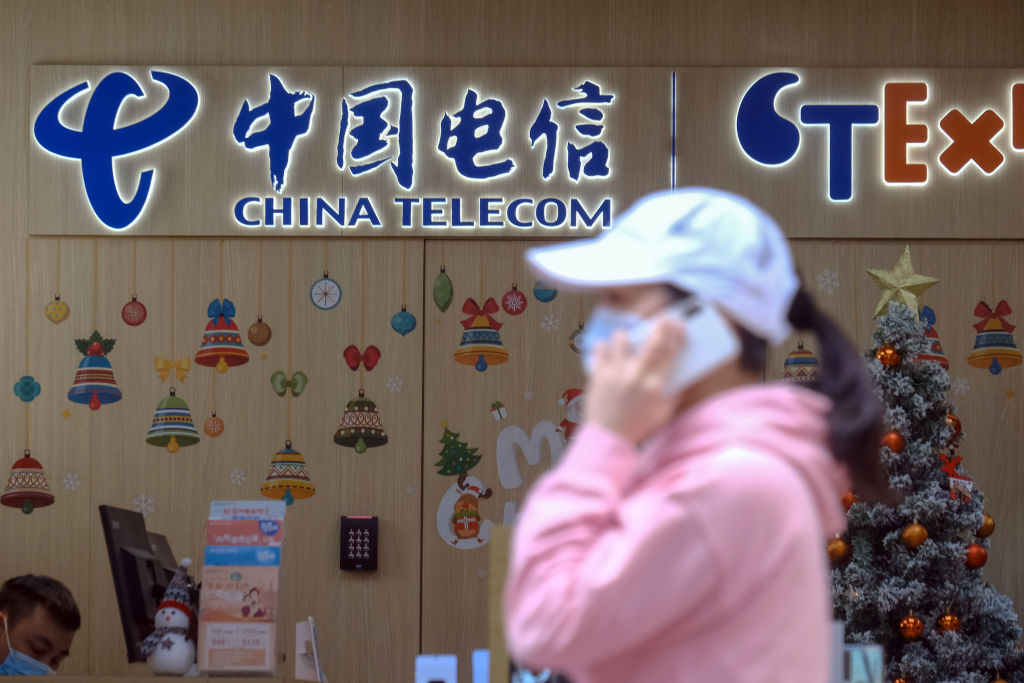
Pedestrians pass in front of the New York Stock Exchange (NYSE) in New York, U.S., October 2, 2020. /Getty
Pedestrians pass in front of the New York Stock Exchange (NYSE) in New York, U.S., October 2, 2020. /Getty
Editor's note: Matteo Giovannini is a finance professional at the Industrial and Commercial Bank of China in Beijing and a member of the China Task Force at the Italian Ministry of Economic Development. The article reflects the author's views, and not necessarily those of CGTN.
In a statement issued on late Monday U.S. time, the New York Stock Exchange (NYSE) has unexpectedly decided to reverse the decision to delist China Telecom Corporation Limited, China Mobile Limited, and China Unicom (Hong Kong) Limited, the three largest Chinese telecommunications companies, as a result of "further consultation with relevant authorities in connection with Office of Foreign Assets Control".
This resolution marks a decisive U-turn from the previous plan of delisting due to an executive order signed by President Trump in November that was aimed at preventing American corporations and individual citizens from investing in 31 firms labeled as "owned or controlled by the Chinese military".
The timing of the decision made by the NYSE is key in understating the rationale behind the move since it comes a couple of weeks before the inauguration day of the Biden administration and anticipates the implementation of the Trump's investment ban next Monday.
In this regard, the officials at the U.S. exchange may have preferred to assume a conservative approach by guaranteeing the stability of the market while offering a chance to the new administration to make rational decisions when in office without paying the consequences of moves made by a current administration whose sole intent is to create a bit of chaos before leaving.
In addition, backtracking on the plan to delist the companies, motivated by the requirement for Chinese companies to meet U.S. accounting standards, is welcome by every kind of stakeholder since it avoids the threat of further inflaming an already tense relationship between Washington and Beijing.

A China Telecom Corp. store in Hong Kong, China, January 4, 2021. /Getty
A China Telecom Corp. store in Hong Kong, China, January 4, 2021. /Getty
The NYSE may have also taken into account that the new administration is largely expected to have a radically different attitude towards China through a more cooperative and less confrontational approach that could reassure global markets and increase the margin of negotiation between the world's two largest economies.
It cannot be denied that the NYSE's decision may have been guided by what is happening on the other side of the Pacific Ocean, where China is increasingly opening up its domestic financial market to foreign capitals and investors, offering more and more opportunities to American financial institutions to increase their presence. A ban on the U.S. exchanges would mean sending out an extremely bad signal that could potentially end up in a boomerang for American firms that have interests in China.
The officials at the U.S. exchange may have also taken into account that there are currently over 200 Chinese companies listed on U.S. exchanges that account for 2.2 trillion dollars in total market capitalization. A ban would cause a major delisting that would eventually lead to a massive movement of capital out of the U.S., something that could backfire on American investors.
To be clear, the decision to expel Chinese stocks from U.S. exchanges would affect not only big names on Wall Street but also Main Street since individual investors who bought shares in Alibaba or have their retirement savings invested in ETF funds that track Chinese companies would be severely affected in their own pockets.
Certainly, the NYSE may have also be moved by a long-term view compared to the short-term approach that is typical of American politics and could have taken into account that the eventuality of a delisting only serves as a boost to speed up an already ongoing process of further developing China's exchanges.
In this context, the eventuality of a massive exodus from U.S. exchanges due to regulatory restrictions wouldn't be greeted with sadness by Chinese companies considering that China's domestic financial market today is far more sophisticated than what it was 10 years ago. It offers an array of services that has nothing to envy to what a company can find on the NYSE or on the Nasdaq.
The recently published 2020 IPO fundraising global list by KPMG that displays Hong Kong, Shanghai and Shenzhen exchanges in three of the top five spots and in an upward trend could have also suggested the NYSE come to a decision and to assume a more conventional posture in order to try to maintain the status quo and to protect the relative position of leadership that the U.S. exchanges still enjoy in global markets.
China and the U.S. are destined to be the major protagonists of this century, and it is thus in the interest of both parties, whose financial markets are more and more intertwined, to maintain an open and collaborative approach because the eventuality of decoupling is not only complicated but also extremely disadvantageous.
(If you want to contribute and have specific expertise, please contact us at opinions@cgtn.com.)

